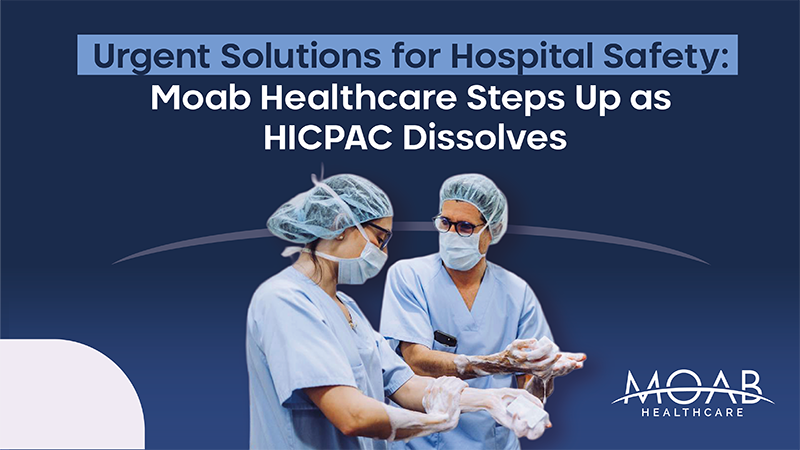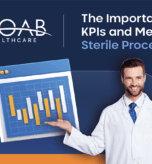[vc_row][vc_column][vc_column_text]
Urgent Solutions for Hospital Safety: Moab Healthcare Steps Up as HICPAC Dissolves
The abrupt dissolution of the Healthcare Infection Control Practices Advisory Committee (HICPAC) has sent shockwaves through the healthcare community, leaving hospitals exposed and vulnerable. For over three decades, HICPAC provided evidence-based infection control guidelines that shaped hospital protocols, protected patients, and ensured healthcare workers had clear, science-driven recommendations to prevent healthcare-associated infections (HAIs). Now, with its abrupt removal, the safety net is gone, and the stakes for hospital executives have never been higher.
Without HICPAC’s expert guidance, hospitals now face uncertainty in maintaining best practices for sterilization, isolation precautions, and antimicrobial resistance strategies. Organizations like AAMI, AORN, and HSPA have collaborated with HICPAC and have long emphasized the critical importance of evidence-based infection control standards, and their continued advocacy underscores the void left by HICPAC’s dissolution. However, even with support from these industry leaders, health systems are at significant risk of encountering inconsistencies in infection prevention practices. This could lead to increased healthcare-associated infections, operational inefficiencies, and a decline in patient safety—challenges that will require substantial resources and unified efforts to overcome.
Key Areas of Hospital Operations at Risk
The dissolution of HICPAC will have far-reaching consequences across multiple hospital departments, particularly those dependent upon the sterile processing department, where adherence to standardized infection control protocols is critical. Below are the key areas of hospital operations that may be significantly impacted:
Sterile Processing & Instrument Reprocessing
HICPAC has provided guidance to the CDC and HHS on infection control practices, including those relevant to sterile processing department (SPD) operations, and has issued detailed recommendations for reprocessing reusable devices, such as flexible endoscopes. Without HICPAC’s oversight, hospitals may struggle to maintain consistent sterilization protocols, leading to variations in decontamination procedures and an increased risk of surgical site infections. The absence of updated guidelines could result in inefficient workflow, improper handling of contaminated instruments, and gaps in compliance with best practices.
Surgical Services & Operating Room Efficiency
Infection control measures in surgical environments rely on precise sterilization and aseptic techniques. The lack of clear guidance could lead to higher infection rates, delayed procedures due to sterilization inconsistencies, and increased costs associated with infection-related complications.
Supply Chain & Equipment Management
Sterile processing departments depend on standardized protocols for selecting and maintaining sterilization equipment. Without HICPAC’s recommendations, hospitals may face uncertainty in equipment validation, leading to inefficiencies in procurement and potential lapses in sterility assurance.
Staff Training & Compliance
Infection prevention education is a cornerstone of hospital operations. The dissolution of HICPAC removes a centralized source of training standards, making it harder for sterile processing technicians and perioperative staff to stay updated on best practices. This could result in inconsistent training programs, increasing the likelihood of errors in instrument reprocessing.
Moab Healthcare: Driving Improved Performance in Infection Control
At Moab Healthcare, we recognize the urgency of this challenge. Our assessment and education programs are designed to bridge the gap left by HICPAC’s dissolution, specifically related to the Sterile Processing Department. Through tailored training, workflow optimization, and compliance support, we empower hospitals to uphold the highest standards of infection control—ensuring that quality does not suffer despite regulatory upheaval.
Elevating Outcomes in Infection Control Through Optimizing Sterile Processing Operations
At Moab Healthcare, we believe comprehensive assessments are the cornerstone of excellence in sterile processing. Our approach focuses on tailoring data-driven solutions to optimize quality, safety, and efficiency.
- Holistic Evaluation: We assess every aspect of your Sterile Processing Department (SPD), including infrastructure, staff competencies, and workflow efficiency.
- Actionable Insights: Our assessments identify gaps and offer practical, sustainable solutions aligned with industry standards.
- Empowerment: We enable organizations to implement improvements that enhance compliance, safety, and operational performance.
The growing demands on healthcare operations make such assessments more critical than ever. Moab Healthcare’s process provides a roadmap to address challenges and plan for sustainable growth.
- Improved Outcomes: Address staffing inefficiencies, reduce infection risks, and enhance productivity.
- Patient Safety: Strengthen SPDs to deliver safe, high-quality care and meet regulatory standards.
- Cost Efficiency: Minimize financial inefficiencies through optimized processes.
Our philosophy extends beyond solving immediate issues; it fosters a culture of continuous improvement and collaboration.
- Stakeholder Engagement: Prioritized recommendations ensure impactful and sustainable change.
- Customized Solutions: Assessments tailored to your organization’s specific needs translate into measurable outcomes.
- Industry Leadership: Transform SPDs into models of innovation and excellence.
Long-Term Impacts of Moab Healthcare’s Education and Training Programs
At Moab Healthcare, we understand that the success of any healthcare organization hinges on the skills, knowledge, and confidence of its staff. Our education, training, and onboarding programs are designed not just to meet immediate needs but to deliver long-term, transformative benefits that resonate throughout the organization. By aligning our programs with industry-leading standards such as HSPA, CBSPD, and AIMEE, we ensure that your teams are equipped to thrive in a rapidly evolving healthcare landscape. This directly impacts infection control by equipping healthcare professionals to implement evidence-based practices that minimize risks, safeguard patient outcomes, and maintain operational integrity in sterile processing and perioperative areas.
Our approach focuses on creating adaptable, forward-thinking teams capable of driving continuous improvement and operational excellence. The long-term impacts of our programs include:
- Higher Staff Retention: Comprehensive onboarding and training foster a sense of belonging and professional growth, reducing turnover and creating a more stable workforce.
- Enhanced Patient Safety: Well-trained teams ensure compliance with critical standards like AAMI and The Joint Commission, minimizing errors, improving patient outcomes, and significantly reducing healthcare-associated infections (HAIs).
- Operational Efficiency: By addressing skill gaps and aligning practices with best-in-class workflows, we help organizations streamline processes and reduce inefficiencies.
- Cultural Excellence: Our programs foster a culture of learning and accountability, empowering staff to take ownership of their roles and contribute meaningfully to organizational goals.
The benefits of Moab Healthcare’s training and onboarding programs extend far beyond compliance and skill-building; they create a foundation for lasting success. By prioritizing the professional development of sterile processing technicians and other key personnel, we help healthcare organizations position themselves as leaders in quality care and innovation. This holistic approach ensures that every investment in education yields measurable, lasting results—benefiting patients, staff, and the organization as a whole.
With Moab Healthcare, education is not a one-time initiative but an ongoing partnership that drives growth, excellence, and sustainability for years to come.
Conclusion
Our expertise in sterile processing, perioperative efficiency, and infection prevention positions us as a trusted partner for healthcare organizations navigating this transition. By leveraging Moab Healthcare’s solutions, hospitals can maintain consistent, evidence-based practices that safeguard patient outcomes and operational integrity.
The healthcare landscape is evolving, but Moab Healthcare remains steadfast in its commitment to protecting patients, supporting healthcare professionals, and driving excellence in infection control. Let’s work together to ensure that the dissolution of HICPAC does not compromise the safety and efficiency of our hospitals.
For more information on how Moab Healthcare can support your organization, contact us today.
Jeremy Robinson
https://www.linkedin.com/in/jeremyrobinson21/[/vc_column_text][/vc_column][/vc_row]



